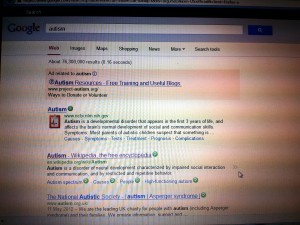It’s a scene that many parents are all too familiar with. You’re sitting in a doctor’s office and you’ve just received news that your child has autism. You did know, of course, that something was wrong – after all, that’s why you had your child assessed – but you’ve been in a weird twilight zone of denial, in which you have managed to convince yourself that this thing that’s wrong with your child is just temporary, that it’s nothing a bit of speech therapy or O.T. won’t cure. And now, here’s this doctor telling you that your child will be living with autism for the rest of his or her life.
You can barely listen as the doctor goes on about how your child’s trajectory through life will be atypical, delayed, and fraught with challenges. You are too stunned to pay attention to anything but the hopes and dreams you had for your family crashing all around you.
How do you cope? How do parents find out that their child has a lifelong developmental disability – one that will in all likelihood necessitate some level of permanent care – and then go on to live some kind of a normal life?
Tip #1 – Remember that the doctor does not have a crystal ball
The doctor can’t just say to you, “Your kid has autism. See ya!” He has to talk to you about therapies, strategies, next steps – and that inevitably involves talk about how he sees your child’s future. But the thing is, many doctors tend to be a bit pessimistic, and they will give you the worst case scenario.
When we were getting my own child’s diagnosis five years ago, the doctor could not have painted a bleaker picture of the future if he had tried. We heard all about the stuff my son would never achieve, experiences he would never have, things he would never be able to do, the intensive level of care he would need for the rest of his life.
The doctor was not trying to be mean. He wasn’t trying to be negative. He was just presenting what he saw to be the reality. He had no way of knowing that in the first year of IBI therapy, this kid would make 23 months worth of gains. He did not know about the mathematical aptitude or unique problem-solving skills, and he could not predict that given the right educational environment, my child would be able to soar.
Anything the doctor tells you about your child’s future is just a guess – an educated guess, but a guess nonetheless. Don’t let bleak predictions make you give up hope. Your child needs for you to believe in his or her potential, and to be frank, if you have a bit of faith, it will do your own spirit the world of good.
Tip #2 – Watch out for information overload
Human beings are curious by nature, especially when it comes to the wellbeing of their offspring. I would venture to say that most parents, on receiving their child’s autism diagnosis, go home and make a beeline for the computer so they can Google “autism”. I know I did.
The Internet can be pure crap, though. A Google search for “autism” yields over 76 million results. If we very generously assume that 10% of the information on the Internet is completely solid and scientifically proven and not the subject of any debate or controversy, that leaves you with seven million pages of “good” information.
It is a daunting task, trying to filter out the seven million pieces of “good” information from all the junk. It can make the most hardy of souls feel like they’re drowning.
Information is all well and good, but it has to be consumed in manageable doses, especially in the beginning. The diagnosing doctor will give you fact sheets and other information. That is all you need in those initial days while you are trying to adjust to this new reality.
Tip #3 – Get your name onto waiting lists and find out about funding
Your doctor will probably give you the names and phone numbers of local services, like speech therapy, O.T. , and autism intervention services. If he doesn’t, call him back and ask. Then call and enroll for the services. Some areas will have one central place that organizes all of the services; in other places it is more fragmented. No matter which way it works, it is better to start services as early as you can, and unless you live in some kind of Utopia, the places you call are bound to have waiting lists.
At the same time, find out about funding. If you live in a country with socialized health care, as I do, then many of the services for your child could be covered by the government. You may be entitled to disability tax credits and funding for respite care or specialized equipment. Your local autism foundation should have information about the available funding, and they may even have experts who will help you fill in the forms.
Tip #4 – Don’t let autism define your child
This may seem self-evident, but in the wake of receiving the blow of an autism diagnosis, it is hard to think of anything else. Parents of newly diagnosed kids often go through a kind of grieving process as they come to terms with the loss of what they thought their “reality” was. You may find your heart breaking every time you look at your child.
But remember that the diagnosis itself has not changed anything. Your child is still the same person he or she was yesterday, or last week, or last month. Your kid may have autism, but he or she is first and foremost a little kid, with those little quirks and personality traits that guarantee uniqueness.
Autism will always be a part of who your child is, but it is far from being the full picture.
Tip #5 – Take care of yourself and your relationships
When I saw my family doctor shortly after my son’s diagnosis, he gave me a startling statistic: about 80% of couples who are parents of kids with special needs or chronic illnesses split up within two years of diagnosis. It is easy to be on the outside looking in, and say that parents should draw strength from one another, but the truth is that something like this puts a huge strain on many relationships.
The thing is, each parent is thinking about autism, and how they can help their child. This becomes the singular focus consuming both of them, so much so that neither of them has room for anything else. And so they neglect themselves, and they neglect each other. It’s not their fault – they are just putting their child’s needs ahead of their own.
Do we not deserve to be happy, though? Yes, parenting our kids is the most important job we’ll ever have, but we are also individuals in our own right, and if we neglect ourselves and the relationships with the people we care about, we will drown.
So make sure you take time to be with your partner, just because. Spend time with your other children. Nurture your friendships, and most of all, take time out for yourself.
And don’t feel guilty about taking care of yourself. You deserve it.
(Photo credit: Kirsten Doyle)












